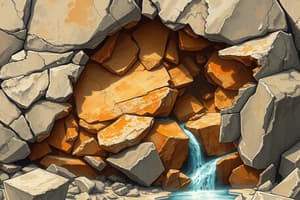Podcast
Questions and Answers
Which specialty of geology focuses on the study of rock structures such as folds and faults?
Which specialty of geology focuses on the study of rock structures such as folds and faults?
- Structural geology (correct)
- Sedimentology
- Paleontology
- Geochemistry
What do minerals have that distinguishes them from other substances?
What do minerals have that distinguishes them from other substances?
- They are only found in sedimentary rocks.
- They are non-organic forms.
- They can be liquid or gaseous.
- They possess a specific chemical composition and crystalline structure. (correct)
What is the primary role of principles of relative dating and absolute dating in geology?
What is the primary role of principles of relative dating and absolute dating in geology?
- To analyze rock textures and colors.
- To classify different types of minerals.
- To study the composition of sedimentary rocks.
- To determine the age and timing of geological events. (correct)
Which of the following accurately describes sedimentology?
Which of the following accurately describes sedimentology?
What are rocks primarily composed of?
What are rocks primarily composed of?
What is primarily responsible for Earth's internal heat?
What is primarily responsible for Earth's internal heat?
Which type of weathering involves a change in the chemical composition of rocks?
Which type of weathering involves a change in the chemical composition of rocks?
How do convection currents in the mantle influence geological processes?
How do convection currents in the mantle influence geological processes?
What process contributes to soil formation and the creation of sediments?
What process contributes to soil formation and the creation of sediments?
Which of the following is an example of biological weathering?
Which of the following is an example of biological weathering?
Which geological phenomenon is primarily driven by Earth's internal heat?
Which geological phenomenon is primarily driven by Earth's internal heat?
What factors influence the rate of weathering?
What factors influence the rate of weathering?
Which component of geology studies the history of life on Earth?
Which component of geology studies the history of life on Earth?
Flashcards
Structural Geology
Structural Geology
The study of rock structures, like folds and faults.
Geochemistry
Geochemistry
Study of Earth's chemical composition.
Sedimentology
Sedimentology
The study of sediments and sedimentary rocks.
Earth's History
Earth's History
Signup and view all the flashcards
Minerals
Minerals
Signup and view all the flashcards
Weathering
Weathering
Signup and view all the flashcards
Physical Weathering
Physical Weathering
Signup and view all the flashcards
Chemical Weathering
Chemical Weathering
Signup and view all the flashcards
Internal Heat
Internal Heat
Signup and view all the flashcards
Convection Currents
Convection Currents
Signup and view all the flashcards
Volcanism
Volcanism
Signup and view all the flashcards
Plate Tectonics
Plate Tectonics
Signup and view all the flashcards
Geology
Geology
Signup and view all the flashcards
Study Notes
Weathering
- Weathering is the breakdown of rocks, minerals, and soil by physical, chemical, or biological processes.
- Physical weathering involves the disintegration of rocks into smaller pieces without changing their chemical composition. Examples include frost wedging (water expands in cracks), thermal expansion and contraction (temperature changes), and abrasion (rocks rubbing against each other).
- Chemical weathering involves the alteration of the chemical composition of rocks. This process frequently involves water, acids, or other chemicals that react with the minerals in the rock, such as oxidation (rust), hydrolysis (breakdown by water), and carbonation (reaction with carbonic acid).
- Biological weathering involves the role of living organisms in the breakdown of rocks. Examples include plant roots growing into cracks, burrowing animals, and acid secretions from fungi and bacteria.
- Rates of weathering are affected by climate (temperature, precipitation), rock type, and topography. Regions with high temperatures and rainfall tend to experience faster weathering.
- The products of weathering are transported away by erosion, contributing to soil formation and the creation of sediments.
Internal Heat
- Earth's internal heat is primarily derived from residual heat from planetary formation and radioactive decay within the Earth.
- The heat flow from the Earth's interior drives convection currents in the mantle.
- These convection currents are crucial for plate tectonics.
- The Earth's internal heat distribution varies with depth, generally decreasing with depth but with localized variations related to active geologically features such as volcanoes, mid-ocean ridges, and hot spots.
- Earth's internal heat is responsible for several geological phenomena:
- Volcanism: Molten rock (magma) rises from the interior to the surface, forming volcanoes.
- Plate tectonics: The movement of tectonic plates is driven by convection currents in the mantle.
- Earthquakes: Movement along faults within the Earth's crust is caused by stresses created by the tectonic plates' movement. (In the case of heat related earthquakes, stress is accumulated due to local mantle activity.)
Geology
- Geology is the science that studies the Earth.
- It encompasses the processes that shape the Earth's surface and interior, including rock formation, plate tectonics, the movement of continents, and the history of life.
- Geology is divided into several specialties, including structural geology (study of rock structures like folds and faults), geochemistry (study of the chemical composition of the Earth), and sedimentology (study of sediments and sedimentary rocks).
- The study of the Earth's history, including both the physical changes and biological evolution, is referred to as Earth's history.
- Principles of relative dating and absolute dating help scientists understand the timing of events in the Earth's history.
- Minerals are naturally occurring solid substances with a specific chemical composition and crystalline structure. They are essential to understanding the formation of rocks.
- Rocks are aggregates of one or more minerals with varying properties (e.g. texture, color, composition) depending on the process involved in their formation.
Studying That Suits You
Use AI to generate personalized quizzes and flashcards to suit your learning preferences.




